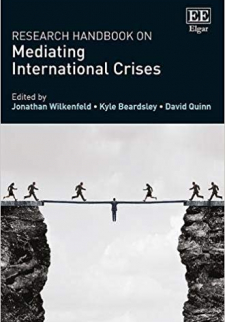Research Handbook on Mediating International Crises
Kyle Beardsley, Jonathan Wilkenfeld, David Quinn
2019
Edward Elgar Pub

Current conceptions of mediation can often fail to capture the complexity and intricacy of modern conflicts. This Research Handbook addresses this problem by presenting the leading expert opinions on international mediation, examining how international mediation practices, mechanisms and institutions should adapt to the changing characteristics of contemporary international crises.
Chapters consider the challenges facing the international community when aiming to achieve lasting resolutions in intrastate and interstate conflicts during acute periods of crisis and potential or actual violence escalation. The authors also provide much-needed context for 'gray zone conflict', the actions of non-state actors, gender dynamics and biases that hinder mediation. The ever-expanding role of mediation means authors also cover human security, climate diplomacy and cyber disputes. Using extensive analysis of salient cases as well as quantitative studies of aggregate trends, this Research Handbook is the vital reference work for mediation in contemporary international politics. The concluding chapter explores the overarching themes and key policy recommendations from the leading voices in mediation.
An essential reference for postgraduate researchers of international politics, this Research Handbook provides both quantitative and qualitative analysis to further case knowledge for research. In addition, the case studies and concluding chapter will be a much-needed resource for policymakers and practitioners in defence policy and peace advocacy due to their emphasis on lessons learned and best practice.
